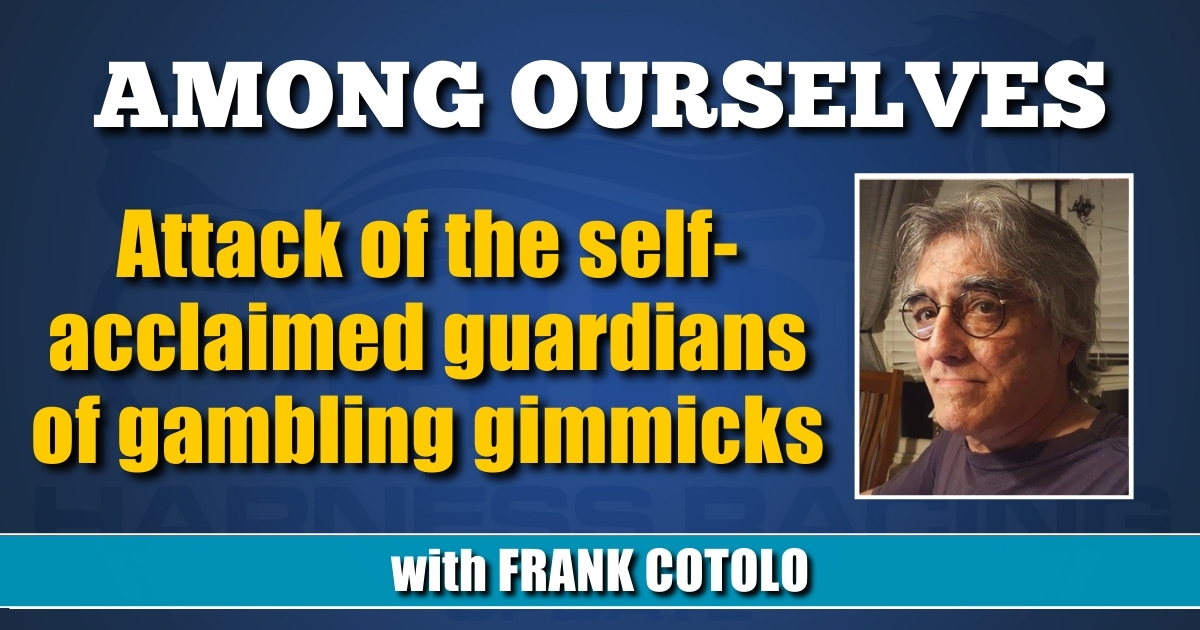Attack of the self-acclaimed guardians of gambling gimmicks
by Frank Cotolo
I wanted to consider myself an expert per James Quinn’s three simple ingredients. If I were near as smart as the company I kept in those days I may have been able to write an equation for it. But I could not even pass the written test to be a contestant on Wheel Of Fortune. Maybe I needed to construct a Rubik’s Cube with only three matching sides; two representing my knowledge and experience and one for my intuition. My DNA refused all attempts.
Meanwhile my address found its way onto a mailing list targeting the legion of desperate and degenerate sports gamblers; or as the senders called it, The Sucker List. In a few days my personal Post Office box overflowed.
“You’re going to need a bigger box or less friends,” said actor/comedian Ron Carey (High Anxiety, Barney Miller) whose rented box was next to mine.
“These are ads from fellas claiming to have winning formulas at the races. Look,” I said, showing him one.
He read the envelope. “Risk-Free Ricky releases his racetrack secrets. Make a thousand a day…”
“And he only wants sixty-nine bucks.”
Tommy Turfmaster, Big Buck’s Profitable Picks, Sid Swift’s Super Solutions at The Races and on and on… It was nothing new but neither were suckers. Especially beginners.
When Off Track Betting (OTB) opened in New York in the ’70s, there was an ad running in local newspapers promising winners from a phone call. A lady answered and said, “I’m going to give you a horse to bet. You can play however much you want; all I want are the winnings of a 10-dollar ticket which you’ll send in the form of a money order to a post office box I’ll give you when you call back after winning.” I agreed and she said, “Corporal King in the fifth at Belmont.”
I told a friend about it and he visited OTB and placed $20 to win on Corporal King at long odds. We listened to the race at an OTB parlor; Corporal King got a single call and lost. We were curious; if it were a smart scheme, why would it give out a loser?
“Because she made money on the winner,” my friend said Then he explained the simple brilliance of the fraud. “She picks a single race a day. One with a big field. Like Corporate King was in a with 12. She gets a dozen phone calls. She gives each caller a different horse in the same race. One of the callers wins and sends her the winnings of a 10-dollar ticket.”
“Oh, my gawd,” I said, “you’re a Sherlock. She’s winning every race on a program if she gets 10 calls.”
The phone scheme had no overhead but the mail order pieces were carefully designed printed pamphlets and follow-up pieces that cost money to mail. But at 60-some-odd bucks a clip the senders knew there were plenty of suckers on their lists willing to take shots at “crushing the races for big profits.”
The guardians of gambling gimmicks mailed me ads in L.A. even while I earned a prolific profile as a writer in racing publications like American Turf Monthly and Harness Horse. I wrote back to a few of them more than once with the following offer:
“If you send me a free copy of your formula and it lives up to its expectations, I will pay you ten (10) times the asking price and write a glowing review in publications where I contribute.”
I never received a single response but remained on their mailing lists.
“I guess a lot of desperate gamblers go for that stuff,” Ron said.
I said, “I understand the attraction. Doing a little work for big rewards.”
This was my goal, too, but I did not buy into the myths of a secret formula or specific regularizer. Ultimately, I wanted to profit from pari-mutuel betting with as easy a formula as possible; one I would not construct into a so-called super system with strict rules and conditioned betting boundaries; one demanding precise race types to address; one promising a fair return-on-investment profit percentage; one I would not be able to package and sell to support its failure.
I was given time to ruminate…
My writing career forced me to take a hiatus from pari-mutuel activity. I became involved with a surreptitious plan promising adventure and international intrigue with no connection to pari-mutuel racing. The plan was concocted by a tycoon (let’s call him Sir Delaney) who reportedly lived somewhere in Great Britain. The plan included being stationed on a tanker-ship-turned-broadcast station sailing along the borders of international waters on the North Sea. Soon I was on my way to England via France to be a member of Wolfman Jack’s clandestine crew of pirate radio broadcasters.

















